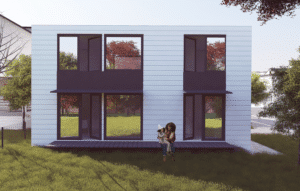
Reframe Systems' 900-square-foot accessory dwelling unit includes all-electric heat pumps and Passive House building techniques. Image courtesy of Reframe Systems
Towns and cities now have answers to what they can – and, importantly, can’t – do to regulate accessory dwelling units.
ADUs up to 900 square feet in size were legalized on most single-family lots statewide in Gov. Maura Healey’s Affordable Homes Act, passed by the Legislature this summer.
The Healey administration hopes the move will allow between 8,000 and 10,000 ADUs to be built over 10 years. The state is roughly 200,000 homes short of demand, the administration estimates.
“ADUs are a simple way to add housing throughout the state while providing more options for older homeowners looking to age in place or families looking to give a child with special needs more independence,” state Housing Secretary Ed Augustus said in a statement Monday. “The regulations we are developing will make it easier for communities to craft ADU ordinances that allow this housing with the ability to meet their local needs.”
Now, a six-page set of draft ADU rules issued Monday by the state Executive Office of Housing and Livable Communities bans a number of common tactics towns have used to block or severely limit the construction of ADUs in the past.
The draft ADU rules explicitly ban the following tactics:
- Mandating special permits, zoning variances or other sorts of discretionary approvals to build an ADU.
- Requiring that a home must be owner-occupied to have a valid ADU on the property.
- Minimum parking requirements: The new ADU rules say towns can’t require any additional off-street parking spots within half a mile of bus stops and train or subway stations, or more than one off-street parking spot outside of those half-mile circles.
- Only allowing ADUs for seniors or ADUs that are rented at below-market rates.
- Caps on the number of ADUs that can be built town-wide or within a specific zoning district, or density limits.
- Requirements that ADUs can only be built when they’re attached to or carved out of an existing house.
And, in a boost to several modular housing companies that have popped up in Massachusetts in recent years, towns and cities can’t adopt rules for modular ADUs that are tougher than the state building code.
The draft ADU rules make clear that towns and cities can put some regulations in place, like design standards or setback rules. However, they have to be “reasonable,” the draft rules say, can’t make it overly expensive to build an ADU and can’t be tougher than rules that apply to single-family houses in the same zoning district.
State Title 5 environmental laws still apply, though, limiting the number of bedrooms in an ADU based on sewer and septic capacity.
The state is taking comments on the draft ADU rules between Dec. 20 and Jan. 10, and plans a second public information session Dec. 16. The state held a first info session earlier this morning, and it has posted the draft rules and other information at mass.gov/ADU.
The final ADU rules – including any changes spurred by the results of the public comment period – go into effect Feb. 2.
In this morning’s information session, an Executive Office of Housing and Livable Communities staffer said the state also plans to release a model ADU zoning bylaw that towns and cities can adopt once the new regulations go into effect.






